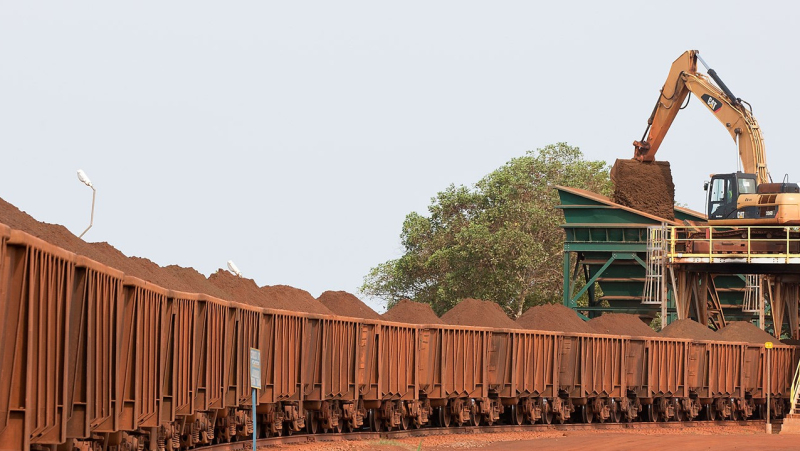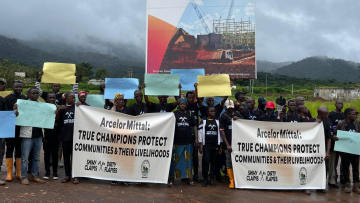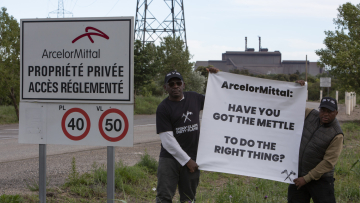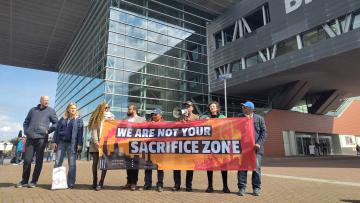
Project – On record
This profile is no longer actively maintained, with the information now possibly out of dateJulia Hovenier – BankTrack

Why this profile?
Since beginning operations in 2011, ArcelorMittal Liberia (AML) has disrespected the rights of the people and nature affected by its operations. It is currently planning to triple its production in Liberia by the end of 2024. Without in-depth community consultation and remediation for previous activities, this expansion will further exacerbate social conflicts, increase the risk of a new pandemic, and put a critical hotspot of biodiversity in danger.
What must happen
Before providing the company with debt for its expansion plans, financiers of the ArcelorMittal group must demand from the company that it does the following in Liberia:
-
Improves its housing and working conditions for employees, and the living conditions of local communities
-
Adopts far stronger mitigation practices to ensure that the risk of biodiversity loss, pandemics, and social unrest are effectively managed
-
Fulfil its social development commitments to the Liberian government
-
Adequately consult with and compensate the local communities impacted by the extension of the iron ore mine
Financiers of the ArcelorMittal group must also adopt strong grievance mechanisms, to ensure that if any of these conditions are not met, there is a channel for affected communities to access remediation.
| Sectors | Mining , Iron and Steel Manufacturing |
| Location |
|
| Status |
Planning
Design
Agreement
Construction
Operation
Closure
Decommission
|
| Website | http://liberia.arcelormittal.com |
ArcelorMittal Liberia (AML) began operations in Liberia in 2011. AML operates one large open pit iron ore mine on Mount Gangra in Nimba county, the Buchanan Port Facility on the central coast near Grand Bassa, and a railway connecting the two. The assets are 85% owned by ArcelorMittal, and 15% owned by the Liberian government. In 2022, AML produced 4.4 million tonnes of iron ore, primarily to supply ArcelorMittal's steel plants in Europe, with any additional ores being sold on the European market. AML has announced plans to expand production at its iron ore mine to 15 million tonnes per year, with aims to complete the expansion by the end of 2024. Since 2021, it has been trying to add an amendment to its Mineral Development Agreement (MDA) which governs its mining operations in Liberia to pave the way for this expansion. However the amendment is currently under the legislative ratification process, with opposition from politicians in Liberia and the EU, critical of the social and ecological impact AML has had.
Impact on human rights and communities
Broken promises to local communities The contract AML signed with the Liberian government in 2005 granting the company the right to mine contains several conditions related to social development. It established that AML would build hospitals, schools, and employ local people in its operations. However, as of August 2023, local people living around AMLs operations, the AML Workers’ Union, and Liberian politicians argue that many of the promises made in the contract have not been fulfilled. In 2019, the Ministry of Mines and Energy wrote to AML criticising its noncompliance with the contract due to the poor status of the hospitals that had been built, and its failure to deliver a school system to the city of Buchanan.
Poor and unequal treatment of workers The AML Workers’ Union has been very vocal about a number of shortcomings by AML to treat its Liberian workers with respect and dignity. According to the Union, local staff do not receive retirement packages, hazard pay, or sufficient support following workplace injuries, especially compared to the predominantly white expat staff. AML’s CEO in 2020 admitted that the housing for Liberian employees is in much worse disrepair compared to the expat housing. In one case, a former AML employee Stephan Nahn lost his arm in a rock crushing machine, after which he was dismissed and was only compensated with a one time US$9,000 payment. Additionally in 2021, AML was found guilty of unfair labour practices by hiring 546 workers as contractors for a prolonged period of time, and denying them benefits. As a result, the Liberian Ministry ordered them to pay a total of US$308,000 to the former workers in compensation.
Impact on nature and environment
Water pollution In May 2022, AML was found guilty of dumping raw sewage into the wetland and river basin near its mining operations in Nimba county. As a result, the Environmental Protection Agency of Liberia fined AML US$110,000 for breaching several water and nature protection laws.
Deforestation of the Nimba nature reserve ArcelorMittal Liberia’s iron ore mine is in the Nimba nature reserve, an area of outstanding biodiversity in West Africa. According to satellite data, since beginning operations in 2011 over 100 square kilometers of tree cover has been lost. That is equivalent to 22% of the forest that existed in 2000, or 18,600 football fields. The clearing of trees to expand the mine, and the rapid population growth surrounding the forest as jobs increase present a significant threat to the biodiversity of the region.
Impact on pandemics
Heightened risk of a new pandemic Tripling the production of AML’s iron ore mine will require massive amounts of deforestation in the Nimba Mountains, and rapid population growth in an already fragile ecosystem. Together these two factors increase the likelihood of “spillover”, i.e. people coming into contact with wildlife, and contracting a virus that could trigger the next global pandemic. A 2023 Reuters investigation named AML’s iron ore mine as one of the most likely places in the world for this to happen. The Nimba nature reserve is home to a large bat population which is widely considered to be the source of the Ebola epidemic. Expanding operations in the Nimba nature reserve will significantly increase the chances of new pandemics by bringing humans and bats into closer contact.
Other impacts
Corruption AML’s operations are governed by a Mineral Development Agreement (MDA), signed in 2005. According to a 2006 report by Global Witness, the original signing of the agreement was rife with bribery, coercion and corruption. The 2005 MDA was widely regarded by international development experts as tilted in the favour of AML rather than Liberia. As AML and the government of Liberia renegotiate the MDA, EU parliamentarians and Liberian political commentators are concerned that the new iteration will also be the result of intransparent, corrupt processes, and a lack of sustainable development for Liberia.
Expanding the iron ore mine to produce 15 million tonnes per year will require an estimated USD 1.4 billion in capital. ArcelorMittal is expected to finance the project off its own balance sheet.
Between February 2016 to Feburary 2023, banks have provided at least 21.6 billion in lending to ArcelorMittal through loans and bond underwriting services. See below for details on each bank:




